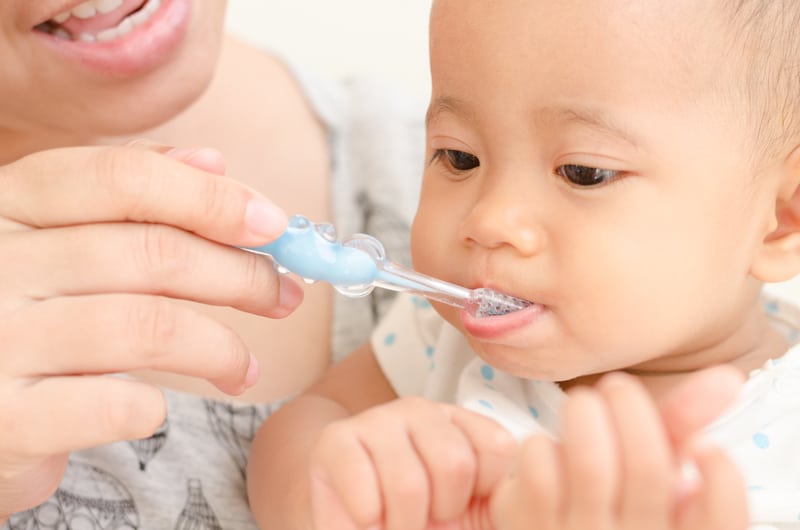Infant Oral Care Made Easy


If you are a new parent, it might be difficult to know what to do when your baby’s teeth first come in. Some parents will have a teething baby right from the start, whereas others will have a 1-year-old that still lacks teeth. Baby bottles and breastfeeding can lead to cavities in small infants, so it’s especially important to follow infant oral care recommendations right from the beginning. Find out what those recommendations are and how to take care of your infant’s delicate baby teeth!
Your Baby’s Teeth
While a baby grows in the womb, they will form their 20 baby teeth. Those teeth will generally still be in the gums at birth, but will slowly start to pop through the gums as an infant ages. When a tooth comes into the mouth, it’s called an “eruption”. If someone says that “a first infant tooth has erupted”, it means that the first baby tooth has come in.
When a child starts to get their teeth, the teething process can be quite painful for your little one. The teeth literally have to break the gums apart in order to come in. No wonder it’s painful for a little baby to get teeth! Most children start to get their first tooth between 4 and 9 months. However, some children get their first few teeth earlier than this, or much later. It’s actually quite normal to have a baby that is over a year old without teeth. It all depends on genetics. If both parents got their teeth early-on, then their child might get teeth early too.
When your baby starts the teething process, you can generally expect them to be fussy, up at night, and drooling more often. Some babies refuse to eat or drink much, will gnaw or chew on everything, and some will struggle to sleep. Help your baby through this process with baby pain-relief medicine, cold teething toys, and lots of cuddles.

Baby Teeth Eruption
Getting teeth is an exciting stage of life for infants. They can start eating a bigger variety of food and they are one step closer to developing speech. These things take time, just as getting all the baby teeth take time. A baby will have 20 total teeth come into the mouth, which is vastly different than an adult’s 32 teeth. Those baby teeth will be smaller and more spaced out. As your child grows, the jaws will also grow. There are wider spaces between the baby teeth to make room for adult teeth that will come in later.
Your child will have the teeth come into the mouth in a certain order. First, the bottom 2 teeth, then the top 2, then the next 2 on bottom, and on top. This happens until all 20 come in. However, don’t want for an infant to get all their baby teeth before you start taking care of them! Start off infant oral care as soon as you see the top of that first baby tooth. The baby teeth are very delicate and are extremely susceptible to decay. Use the following infant oral care tips to avoid tooth decay and oral health problems.
Infant Oral Care Tips
As soon as your baby has their first tooth (even a tiny tip of a tooth), infant oral care measures need to begin. Start wiping your baby’s mouth after every feeding with a damp cloth. This cleans away sugars from the gums and tooth surface. Continue doing this as they get their teeth. The more teeth they get, it may be easier to start brushing with an infant brush. Do this several times a day, just as you wiped their gums with a cloth. Infant oral care is just as important as adult oral hygiene measures. The recommendation by the ADA is to brush at least twice a day and to floss at least once a day.
For an infant, you may want to brush after every meal, as the teeth are more delicate than adult, permanent teeth. Never put a baby down with their bottle to sleep, as long exposure to milk sugars quickly leads to “baby bottle tooth decay”. This is a rapid decay of the baby teeth, and they need those baby teeth for several years. When infants get their tooth fully in their mouth, begin brushing measures. Brush with a rice-sized amount of toothpaste (or smaller if there’s only 1 tooth or so). Wipe an infant’s mouth clean or teach them how to swish water and spit. You will have to brush your child’s teeth day and night for the first few years if you want to avoid tooth decay.
Start flossing once your child’s teeth start to be so close together that you can’t pass the toothbrush bristles between the teeth. Use flossers until your child is old enough to learn how to floss properly. As with everything else, you set the example for your child. If you are brushing and flossing, they will see it and will want to brush and floss as well.

Dental Visits Start Out Early
The American Dental Association and the American Academy of Pediatric Dentistry both advise that dental visits should start within 6 months of an infant getting their first tooth. The first few dental visits for children are very simple are help establish a solid base for your child with the dentist. As all the baby teeth come in, a dentist can see if they are coming in correctly. If not, child orthodontics may be needed to correct bite and alignment issues. These are common issues in children that can be easily corrected with some time with braces. Monitoring infant oral care is the best way for their mouth to stay healthy. That means you take care of their teeth several times a day at home, and we take care of them in our office. If you would like to learn about an infant’s first dental visit, call Dr. Ania’s office today at 303-443-0998!


